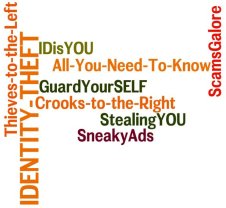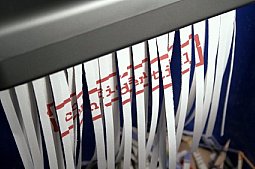The Top 16 Ways to Prevent
IDENTITY THEFT

Victims are helpless when thieves steal private information that banks, corporations, merchants, and the government don't guard closely enough. Victims often get little help from credit-card companies, which are insured against fraud and so have little incentive to fight it. They and others often don't notify customers when security breaches occur. The credit industry really doesn't care very much – and sells personal information to the highest bidder.
Protection against identity theft (ID theft) is always an escalating battle of wits between criminals and security experts. Making matters worse are the credit, banking, and medical industry employees bribed to steal information.
Despite the industries' sloppy protection against ID theft there is still quite a lot you can do – and quite a lot to look out for:
Scams "Protecting" You from Scams
Though the cases of ID theft described above are beyond your control, you can still reduce the overall threat and damage by carefully monitoring your monthly bank and credit card accounts – and guarding access to your personal information – by following the 16 ways to prevent ID theft listed below.
By the way, beware of the sneaky ads offering “free” credit reports (with hidden charges) and "inexpensive" monitoring. Though taking smaller bites, those vultures will rip you off too while promising you protection against ID theft. Credit-monitoring services are not only ineffective but also wildly overpriced. Do NOT trust ANY ad.
The three credit agencies, Equifax, Experian, and Trans Union
will each give you a FREE annual credit report. There is no need to pay. See links below.
Compare the reports from all three credit agencies. You'll be surprised at how they differ (usually in small ways on long-closed accounts, etc.) and you'll get a good idea of the credit industry's overall sloppiness. And getting them to correct the errors usually takes many efforts.
To get all three reports at once, go to www.AnnualCreditReport.com. But there are problems with them, too. Though the law requires credit bureaus to give you a free credit report, they're not required to give your credit score. Some credit bureaus offer to sell you a credit score while you're ordering your credit report. Others pitch credit-monitoring services.
Some consumers think they can't get their credit reports unless they purchase the extras. Realize that you're not required to buy anything. Just skip the ads and go to the section for ordering all three of your reports. Go to www.ftc.gov/freereports for more information about your right to free credit reports.
If You're a VICTIM of Identity Theft
If you suspect that you’re a victim of ID theft, contact AnnualCreditReport.com (copy/paste that into your browser) as well as:
• Equifax at www.equifax.com or 800-525-6285
• Experian at www.experian.com/reportaccess or 888-397-3742
• Trans Union at www.transunion.com or 800-680-7289
• Social Security Administration (SSA) at www.socialsecurity.gov or 800-269-0271
How to REPORT Identity Theft
If your ID was stolen, notify the above agencies and:
• your bank
• local police
• FBI's Internet Fraud division at www.fbi.gov/majcases/fraud/internetschemes (if applicable)
• Federal Trade Commission's ID Theft Clearinghouse at
www.ftc.gov/bcp/edu/microsites/idtheft or 887 ID-Theft (877-438-4338).
For further help, contact:
• www.idtheftcenter.org
• www.privacyrights.org
• www.callforaction.org or 866-ID-Hotline (866-434-6854)
You can see why it's far better to prevent ID Theft.
Email Phishing
Online "phishers" send an email or pop-up message that claims to be
from a business or organization that you deal with – for example, your
Internet service provider (ISP), bank, online payment service, or even a
government agency. The message usually says that you need to “update”
or “validate” your account information. It might threaten some dire
consequence if you don’t respond. The message directs you to a Web site
that looks just like a legitimate organization’s site, but it isn’t. The
purpose of the bogus site is to trick you into revealing your personal
information so they can steal your identity and run up bills or commit
crimes in your name. ... Do not reply or click on the link in the
message. Never email personal or financial information. Use anti-virus software and a firewall.
- The above paragraph is excerpted from the Federal Trade Commission's web site at www.ftc.gov
Also see www.techrepublic.com/blog/10-things/10-tips-for-spotting-a-phishing-email/
The Top 16 Ways to PREVENT Identity Theft
- it's ALL you need to know

1. Destroy all documents with personal information before discarding them where snoops can find them. Get a paper shredder.
2. Remove your name from the marketing lists of Equifax,
Experian, and Trans Union (see web addresses above) – sources of many
unsolicited pre-approved credit applications at
www.optoutprescreen.com or 888-567-8688.
3. Do not click on "Remove from list" email messages, it validates your email address and increases spam.
4. Have your name taken off direct mailing lists by writing to the Direct Marketing Association - Mail Preference Service - PO Box 9008 - Farmington NY 11735.
5. Demand that creditors or landlords remove your Social Security Number (SSN) from all paperwork, and have your original credit report shredded before your eyes. They need to keep only your name and credit score.
6. Order products online only on a secure web site beginning with https:// (not the old http://), and with a closed padlock icon on the bar before the URL. Other tips are available at www.nyc.gov/consumers.
7. ID thefts often begin with insiders at retailers who sell the information on customers' checks or credit cards. It's better to pay with cash or a debit card (shield your typing hand from prying eyes while entering your PIN number).
8. When writing checks to pay for your credit card accounts, include only the last four digits of your account number so not everyone in the banking system will have access to your complete number.
9. Don’t sign the back of your credit cards. Instead, write in "PHOTO ID REQUIRED."
10. When ordering new checks, put your first initial and last name, your work address, and your work phone number. Never have your SSN printed on your checks.
11. Never carry your SSN card in your wallet. Don’t use your SSN on your driver's license, and say no when businesses want to use your SSN for ID.
12. ID thefts often begin with a stolen box of new bank checks in your mailbox. Pick them up at your bank instead.
13. Don't put outgoing mail in a curbside mailbox. Perhaps get an anti-theft/anti-vandal curbside mailbox available for $800 at www.mailtheftsolutions.com or for $350 at www.energytechlabs.com. Or deposit your outgoing mail into a Post Office mailbox. Even better, receive all your mail at a Post Office Box. ID theft victims know it's worth the inconvenience.
14. Beware of a caller claiming to be a court jury coordinator and threatening you with an arrest warrant because you didn't show up for jury duty. If you protest that you never received a summons for jury duty, the caller asks for your SSN and date of birth to “verify and cancel” the arrest warrant. If you comply, kiss your ID goodbye.
15. Photocopy and safely store both sides of your driver’s license, credit card, etc. along with the toll-free phone numbers to call (immediately) if your wallet is lost or stolen. Include all the credit agencies and SSA contact info listed above as well. Immediately notify the police in the jurisdiction where your wallet was stolen or lost.
16. Make sure your computer has up-to-date anti-virus software, a firewall, and remember that scammers disguise themselves as friends and there's often no way to confirm who is on the other end of the user name.
SUMMARY of Ways to Prevent Identity Theft
• Don’t use your birth date, hometown, SSN, or other personal info such as your high school, etc. on social media sites or for online security questions. And don't use those personal identifiers in the obituaries of loved ones. The deceased are often victims of identity theft.
• Don't click on links on websites or attachments in incoming emails – they could infect your computer and steal your identity.
• Shred your snail mail with personal identifiers before putting it in the trash.
• In all, always safeguard all your personal identifiers.
OTHER Ways to Prevent Identity Theft
• Burglary Prevention
• Outdoor Safety - Pickpockets
Finally, beware of a “Good Samaritan” calling you to say he found your lost or stolen wallet and wanting you to come retrieve it – sometimes it’s the actual thief (or another criminal) setting up a trap to rob or rape you. You can meet in the parking lot of the local police station – a criminal won’t want to meet there, but a legitimate Good Samaritan won’t care.









